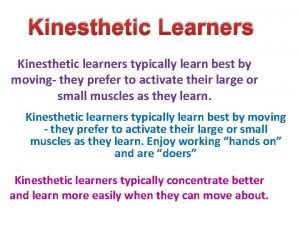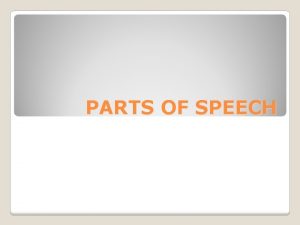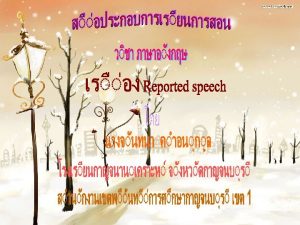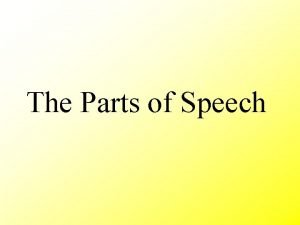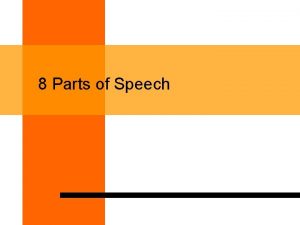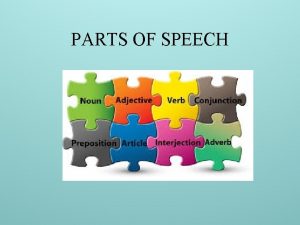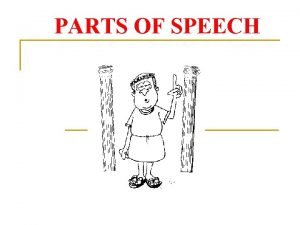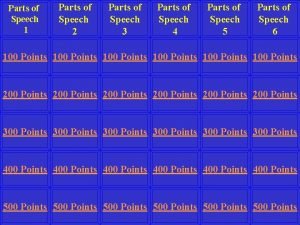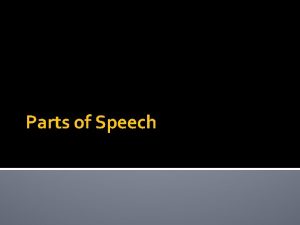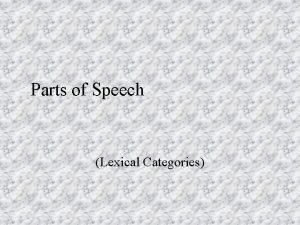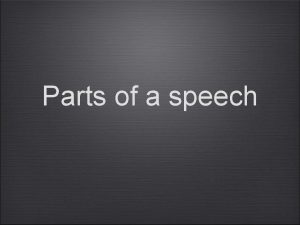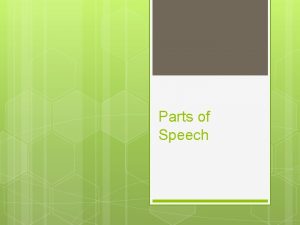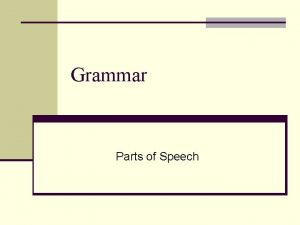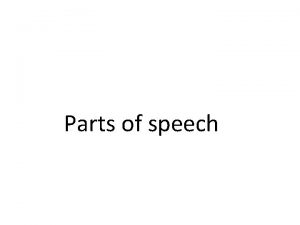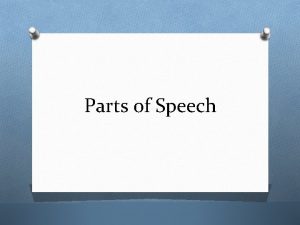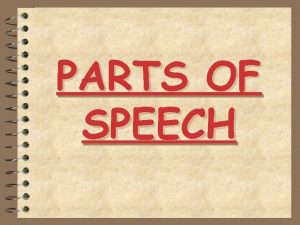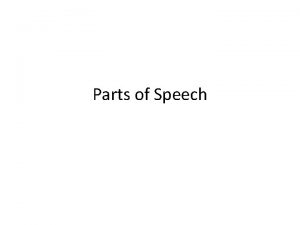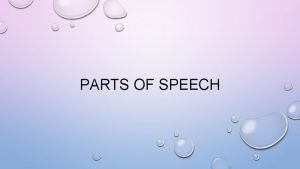PARTS OF SPEECH WHY LEARN THE PARTS OF



![–noun [noun] 1. any member of a class of words that are formally distinguished –noun [noun] 1. any member of a class of words that are formally distinguished](https://slidetodoc.com/presentation_image_h2/0220ae9e438b728e22eef91191859312/image-4.jpg)

















- Slides: 21

PARTS OF SPEECH

WHY LEARN THE PARTS OF SPEECH? 1. 2. 3. 4. 5. Power is in the hands of the educated Helps improve writing Helps understand poetic language Helps with learning of second languages Learning something is rewarding You may already know the parts of speech. This will be great review. If you have never learned them before, you must absolutely do so now. Go over each until you reach complete understanding and comprehension. Ask questions. Try to recognize examples in your daily life. Progress in learning about sentence structure begins here.

NOUNS PRONOUN VERB ADJECTIVE ADVERB CONJUNCTIO N 7. PREPOSITIO N 8. INTERJECTIO N 1. 2. 3. 4. 5. 6. THE PARTS OF SPEECH
![noun noun 1 any member of a class of words that are formally distinguished –noun [noun] 1. any member of a class of words that are formally distinguished](https://slidetodoc.com/presentation_image_h2/0220ae9e438b728e22eef91191859312/image-4.jpg)
–noun [noun] 1. any member of a class of words that are formally distinguished in many languages. ENGLISH: typically by the plural and possessive endings and that can function as the main or only elements of subjects or objects, as cat, belief, writing, Ohio, darkness. Nouns are often thought of as referring to persons, places, things, or ideas. DEFINITION OF A NOUN

NOUNS NAME A: ◦ PERSON: Ms. Kitchens, Usher (don’t you just LOVE his new song? ? ) ◦ PLACE: library, Barcelona, SWHS ◦ THING: table, pony, cheese ◦ IDEA: prosperity, education, freedom TYPES OF NOUNS

PROPER NOUNS COMMON NOUNS President lawsuit Hosni Mubarak Jay-Z Echo the Horsie Sedro-Woolley High School Truth or Consequences, NM money exposition teapot literature SUBCATEGORIES OF NOUNS

CONCRETE NOUNS ABSTRACT NOUNS One Your of your five (5) senses can detect a concrete noun ◦ ◦ ◦ Butter Television Paper Steak music five (5) senses can not sense an abstract noun ◦ ◦ ◦ Bravery Deceit Trust Curiosity relaxation SUBCATEGORIES OF NOUNS

1. When you see a determiner (the, a, an), you can expect a noun to follow. 2. If a word ends in: –tion, -ity, -or, -er, -ant, -ness, it is likely a noun 3. Nouns are commonly at the beginning of sentences 4. Nouns are content words meaning they hold important information for the given sentence HINTS FOR IDENTIFYING A NOUN *NOTE: Nouns may shift their part of speech depending on their position in a sentence. Don’t worry. We’ll work through that together.

1. Bill called me “Cutie, ” so I gave him a valentine with candy in it. 2. Full of ambition, she attended college in the nearest city, Forestville. 3. The lean black cat sat on the rusty fence singing to the Siamese in the window. 4. Rex, who chewed up the slipper, licked father with his tongue. 5. My birthday, next Tuesday, will be celebrated in peace and quiet, since all my friends have gone on vacation. 6. Medicine Hate, Nebraska, is far from Boston; its culture is somewhat different, but its home to Harry. PRACTICE, PRACTICE IDENTIFY THE NOUNS IN THE SENTENCES ABOVE

1. Bill called me “Cutie, ” so I gave him a valentine with candy in it. 2. Full of ambition, she attended college in the nearest city, Forestville. 3. The lean black cat sat on the rusty fence singing to the Siamese in the window. 4. Rex, who chewed up the slipper, licked father with his tongue. 5. My birthday, next Tuesday, will be celebrated in peace and quiet, since all my friends have gone on vacation. 6. Medicine Hat, Nebraska, is far from Boston; its culture is somewhat different, but its home to Harry. ANSWERS CHECK YOUR WORK WITH THE ANSWERS GIVEN ABOVE. DON’T CHEAT! YOU’LL BENEFIT NO ONE.

pronoun (ˈprəʊˌnaʊn) —n one of a class of words that serves to replace a noun phrase that has already been or is about to be mentioned in the sentence or context DEFINITION OF A PRONOUN

If you find a word DOING A NOUN JOB but NOT definitely naming a person, place, thing, or idea, you probably have a pronoun FINDING A PRONOUN

PERSONAL PRONOUNS OTHER PRONOUNS I Some You Someone He any She SUBCATEGORIES OF PRONOUNS

1. 2. 3. 4. 5. He told me who took my pencil, but it was too late to get it back. Somebody wrote something on the board, but no one can read it. Who can say whether this will be a good plan for us? Those are Brussels sprouts; can you tell what these are? The boy whose name I have forgotten left before I paid him everything I owed him. PRACTICE, PRACTICE

1. He told me who took my pencil, but it was too late to get it back. 2. Somebody wrote something on the board, but no one can read it. 3. Who can say whether this will be a good plan for us? 4. Those are Brussels sprouts; can you tell what these are? 5. The boy whose name I have forgotten left before I paid him everything I owed him. ANSWERS CHECK YOUR WORK WITH THE ANSWERS GIVEN ABOVE. DON’T CHEAT! YOU’LL BENEFIT NO ONE.

verb (vurb) –noun any member of a class of words that are formally distinguished in many languages, as in English by taking the past ending in –ed, that function as the main elements of predicates, that typically express action, state, or a relation between two things, and that (when inflected) may be inflected for tense, aspect, voice, mood, and to show agreement with their subject or object. DEFINITION OF A VERB

ACTION VERBS LINKING VERBS/VERBS OF BEING HELPING VERBS RUN TO MAY BE DANCE CAN SKIP MUST DESTROY MIGHT RAIN SHALL SLEEP WILL VEGETATE ECONOMIZE THINK SUBCATEGORIES OF VERBS

u u u u u HAS RUN DID DANCE MIGHT RAIN COULD HAVE BEEN SKIPPING WILL BE DESTROYED MUST HAVE SLEPT SHALL VEGETATE CAN ECONOMIZE MAY HAVE BEEN THINKING EXAMPLES OF HELPING VERBS

u THE MOST IMPORTANT LINKING VERB IS THE VERB “TO BE, ” WHICH COMES IN THESE FORMS, OR “PARTS”: u u AM, ARE, IS, WAS, WERE, BEING, BEEN SHALL HAVE BEEN WAS BEING MIGHT BE EXAMPLES OF LINKING VERBS IN ACTION

Laura and Nancy competed for Jeff’s attention, but he was interested only in Gail. 2. Because he has been coming to your house so often, your grocery bill has increased dramatically. 3. Rex might have been the dog who upset your trash that you had left on your sidewalk. 4. It has really been snowing since the sun went down. 1. PRACTICE, PRACTICE WRITE ALL THE COMPLETE VERBS—INCLUDE ALL HELPERS/LINKERS

1. Laura and Nancy competed for Jeff’s attention, but he was interested only in Gail. 2. Because he has been coming to your house so often, your grocery bill has increased dramatically. 3. Rex might have been the dog who upset your trash that you had left on your sidewalk. 4. It has really been snowing since the sun went down. ANSWERS CHECK YOUR WORK WITH THE ANSWERS GIVEN ABOVE. DON’T CHEAT! YOU’LL BENEFIT NO ONE.
 Hey hey bye bye
Hey hey bye bye Kinesthetic imagery
Kinesthetic imagery Dont ask why why why
Dont ask why why why Why we have to learn history
Why we have to learn history Hình ảnh bộ gõ cơ thể búng tay
Hình ảnh bộ gõ cơ thể búng tay Slidetodoc
Slidetodoc Bổ thể
Bổ thể Tỉ lệ cơ thể trẻ em
Tỉ lệ cơ thể trẻ em Chó sói
Chó sói Tư thế worm breton là gì
Tư thế worm breton là gì Hát lên người ơi
Hát lên người ơi Các môn thể thao bắt đầu bằng tiếng nhảy
Các môn thể thao bắt đầu bằng tiếng nhảy Thế nào là hệ số cao nhất
Thế nào là hệ số cao nhất Các châu lục và đại dương trên thế giới
Các châu lục và đại dương trên thế giới Cong thức tính động năng
Cong thức tính động năng Trời xanh đây là của chúng ta thể thơ
Trời xanh đây là của chúng ta thể thơ Mật thư tọa độ 5x5
Mật thư tọa độ 5x5 101012 bằng
101012 bằng độ dài liên kết
độ dài liên kết Các châu lục và đại dương trên thế giới
Các châu lục và đại dương trên thế giới Thơ thất ngôn tứ tuyệt đường luật
Thơ thất ngôn tứ tuyệt đường luật Quá trình desamine hóa có thể tạo ra
Quá trình desamine hóa có thể tạo ra

